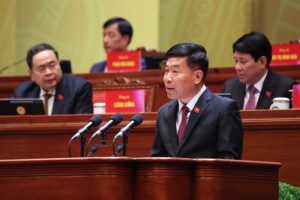Vietnam to Implement Nationwide E10 Fuel Mandate from January 2026 as Part of Green Energy Strategy

Hanoi, The Gulf Observer: In a major step towards its carbon neutrality goals, Vietnam will require all petrol sold nationwide to contain 10 per cent ethanol (E10) starting from January 1, 2026, as part of its transition to green energy and efforts to fulfil net-zero emission targets by 2050.
The Ministry of Industry and Trade (MoIT) confirmed that the move underscores Vietnam’s commitment to building a low-carbon, sustainable energy model. Under the new directive, all petrol types, including A92 and A95, must be blended with ethanol, reflecting global trends where over 50 countries have adopted biofuels to support their energy transitions.
Trần Minh, Deputy Director of the Department of Innovation, Green Transition and Industrial Promotion under the MoIT, stated that Vietnam will require between 1 million and 1.5 million cubic metres of ethanol annually to support nationwide implementation. However, current domestic production can only supply around 450,000 cu.m — approximately 40 per cent of projected demand — necessitating significant imports from leading ethanol producers such as the United States and Argentina.
To address this shortfall, Minister of Industry and Trade Nguyễn Hồng Diên has issued a directive outlining key measures, including upgrading existing ethanol production plants, expanding blending and distribution infrastructure in major economic zones, and ensuring stable raw material supply from cassava, sugarcane and maize. The directive also encourages investment in advanced ethanol technologies.
In line with these efforts, Vietnam Central Biofuels JSC announced it will restart its long-idled Dung Quất biofuel plant in September, with trial operations set for October and full-scale commercial production expected in November. The facility, which produced around 330 tonnes of ethanol per day in 2014 before suspending operations due to market and profitability challenges, is jointly owned by subsidiaries of the state-run Petrovietnam, including Bình Sơn Refining and Petrochemical JSC (61 per cent), PV Oil (38.75 per cent), and PETROSETCO (0.25 per cent). The plant’s CO₂ recovery system will be expanded by 40–50 tonnes per day to enhance operational efficiency.
Simultaneously, Bình Sơn Refining and Petrochemical JSC (BSR) plans to begin trial blending of E10 fuel in August, with initial distribution aimed at the central region. This represents a key milestone in preparations for the 2026 mandate.
PetroVietnam Oil Corporation JSC (PVOIL) has also announced plans to pilot the sale of E10 fuel in selected areas beginning this September. CEO Cao Hoài Dương affirmed the corporation’s readiness to implement the Prime Minister’s directive and ensure a stable ethanol supply through a mix of domestic sourcing and international imports. He added that PVOIL is finalising procedures to certify its E10 blending facilities and will comply with upcoming official regulatory standards.
Currently, Vietnam has six ethanol production facilities, but only two — in Đồng Nai and Đà Nẵng — are operating consistently, contributing around 100,000 cu.m of ethanol annually. Industry experts estimate that if all six plants are reactivated, domestic production could reach 500,000 cu.m per year, narrowing the supply-demand gap.
Supporting this national transition are 214 fuel depots across Vietnam, along with energy giants such as Petrolimex, PVOIL, and Saigon Petro, as well as refineries like Bình Sơn and Nghi Sơn — all of which are now technically equipped to store, blend and distribute E10 fuel.
The MoIT has also launched a communication campaign to raise public awareness about the environmental, economic, and quality benefits of biofuels. Furthermore, local governments are being instructed to incorporate E10 consumption targets into annual development strategies and foster conditions for increased private sector investment.
Experts highlight that the introduction of E10 fuel will not only reduce Vietnam’s dependence on imported fossil fuels but also support environmental protection, strengthen the circular economy, and reinforce the country’s international climate commitments, including under the COP26 framework.
This policy aligns with key resolutions of the Communist Party of Vietnam for the 2025–2030 term and contributes to the broader national strategy for green and digital transformation.


